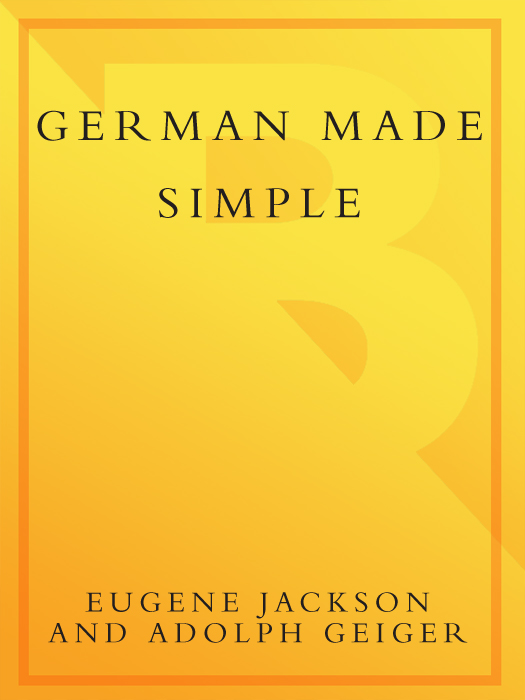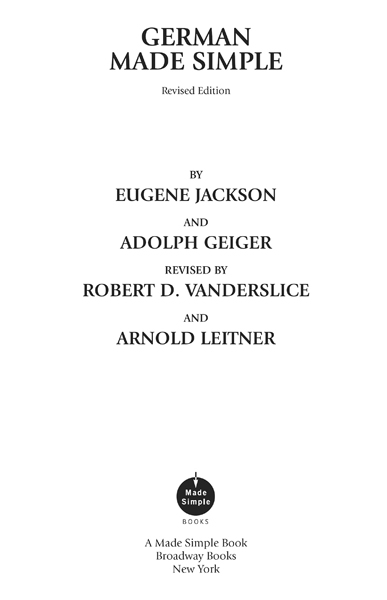All rights reserved.
No part of this book may be reproduced or transmitted in any form or by any means, electronic or mechanical, including photocopying, recording, or by any information storage and retrieval system, without written permission from the publisher.
1745 Broadway, New York, NY 10019.
BROADWAY BOOKS and its logo, a letter B bisected on the diagonal, are trademarks of Random House, Inc. MADE SIMPLE is a trademark of Broadway Books.
CONTENTS
German and English belong to the same family of languagesRelated German and English wordsGerman is not difficult to pronounce and spellA preview of some interesting features of German.
The vowels a, e, i, o, uThe consonantsThe vowel combinations au, ei, euThe modified vowels , , Front ch, back chFinal gThe German alphabetThe German letter Summary of letters and sounds.
Die Familie Clark
THE CLARK FAMILY
The family (die Familie)Gender of nounsDefinite article and noun in the nominative caseAgreement of third-person pronounsAsking somebodys name.
Herr Clark Ist Hungrig
MR. CLARK IS HUNGRY
The indefinite article ein, keinSome German verb endingsThe negative nichtThe formation of questions.
Wer Ist Herr Clark?
WHO IS MR. CLARK?
Noun pluralsCommon professionsPresent tense of gehenThree ways of saying youFamiliar verbs like gehen in the present tenseQuestion wordsAsking somebodys age.
Frau Clark Geht Einkaufen
MRS. CLARK GOES SHOPPING
Imperative (command) formsAccusative case of nouns, definite and indefinite articles, kein, wer and wasFeminine nouns with the ending--inAsking for the price.
Das Haus der Familie Clark
THE HOME OF THE CLARK FAMILY
The one-family house (das Einfamilienhaus)More noun pluralsPresent tense of sein and habenAccusative case, third-person pronounsSome prepositions with the accusative caseLooking for a new home.
Warum Lernt Herr Clark Deutsch?
WHY IS MR. CLARK LEARNING GERMAN?
Compound nounsOppositesPresent tense of antworten, reden, sprechenModal verb wollenWord order: normal and inverted word orderPosition of infinitives.
Eine Deutschstunde
A GERMAN LESSON
Modal verb mssenDative or to case of nouns, articles and keinSome common verbs that may take indirect objectsDative of third person pronouns and of werDative prepositions.
Wo Wohnt die Familie Clark?
WHERE DOES THE CLARK FAMILY LIVE?
Expressions of liking with gern and lieberEs gibt there is, there arePresent tense of laufen, fahrenPrepositions with the dative or accusativeDa(r) and wo(r) combinationsWhat a mess!
Das Geheimnis des Herrn Clark
THE SECRET OF MR. CLARK
Genitive caseThe use of von in place of the genitiveThe interrogative wessenPrepositions with the genitive casePresent tense of kennen and of wissen.
Summary: Nouns, verbs, prepositions (dative, dative or accusative, accusative, genitive)German expressionsVocabulary exercisesGrammar review and exercises: noun declensions, all cases; masculine nouns with -n or -en endingsCompound nounsDialogues: 1. Wo ist die Thomasstrae? 2. Wo hlt der Bus an?Lesestcke: 1. Herr Clark lernt Deutsch. 2. Die Deutschsprachigen Lnder: Deutschland, sterreich und Schweiz.
Ein Freund Besucht Herrn Clark
A FRIEND VISITS MR. CLARK
Present tense of lesen, tretenPossessive adjectives (ein-words)Packing a suitcase.
Herr Clark Telefoniert
MR. CLARK MAKES A PHONE CALL
Infinitives used as nounsNumerals 1 to 100Present tense of knnen, tunDer-words: dieser, jener, jeder, welcher, allerMaking phone calls.
Dollar und Euro
DOLLARS AND EUROS
The European currencyNumerals over 100Arithmetic Subordinate word orderSubordinating conjunctions dass, wennCoordinating conjunctions und, aber, oder, dennTalking about prices.
Frau Clark geht mit ihren Kindern einkaufen
MRS. CLARK GOES SHOPPING
WITH HER CHILDREN
ClothesThe Do-erPresent tense of tragen, lassenAbout adjective endingsAdjectives preceded by a der-wordAdjectives preceded by an ein-wordAdjectives preceded by neither a der-word nor an ein-wordColors.
Wie Spt Ist Es?
WHAT TIME IS IT?
TravellingExpressions of satisfaction or approvalDieser the latter, jener the formerTravel expressionsTime of dayThe 24-hour clockSeparable verbs, present tenseFirst and second person pronouns (nominative, dative, accusative).
Summary: Nouns, verbs, German expressionsVocabulary exercisesGrammar review and exercises: Summary of adjective endings; summary of first-, second- and third-person pronouns (nominative, dative and accusative)Dialogues: 1. Ihre Uhr geht nach. 2. Wo muss ich aussteigen?Lesestck: Karl lernt nicht gern Mathematik.
Der Arbeitstag des Herrn Clark
MR. CLARKS WORKING DAY
Some foodsThe present tense of nehmen, drfenReflexive verbs, present tense of sich setzenSome common reflexive verbsReflexive pronouns in the dativeSeparable verbs in subordinate clauses.
Die kleine Anna war krank
LITTLE ANNE WAS SICK
Present tense of schlafen, sollenRegular and irregular verbs in EnglishThe past tense of weak (regular) verbs in GermanSome familiar weak verbs, present and pastPast tense of strong (irregular) verbsSome familiar strong verbs, present and pastSome expressions referring to past timeA fairy tale:Rotkppchen.
Was fr ein Schreckliches Wetter!
WHAT HORRIBLE WEATHER!
Expressions of weatherSome familiar separable verbs (present and past)The position of the separable prefix of verbs (present and past) in simple sentences and main clausesPosition of separable verbs in subordinate clauses













